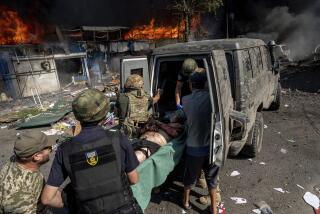More Concerns About Fate of the Muslims : While the world watches, a chilling possibility of slaughter
- Share via
The fate of the Muslim South Slavs at the hands of the Roman Catholic Croatians and the Eastern Orthodox Serbians is the ugliest and, in the long run, may prove to be the most explosive aspect of the unfolding Balkan horror.
Last May, Croat and Serb leaders met secretly in Graz, Austria, to discuss the partition of Bosnia-Herzegovina. According to Misha Glenny, writing in the Aug. 13 New York Review of Books, “Article 1 of the Graz Agreement states that ‘in Mostar (the capital of Herzegovina), the Serbian side considers that the border is the Neretva River, and the Croatian side considers that the whole city of Mostar is included in the Croatian unit.’ ” Since the Neretva River divides Mostar, this agreement to disagree grimly symbolizes the antagonism between the two groups. But Glenny goes on: “Both the Croats and Serbs conveniently forget that Muslims make up the single largest national group in Mostar. . . . “
The worst of the documented atrocities in Bosnia-Herzegovina have targeted Muslims. And many fear that these horrors are just a prelude to the expected Serbian attacks against the Muslim Albanians, who constitute 90% of the province of Kosovo and 33% of the former Yugoslav republic of Macedonia.
Albania has stated that it will go to the military rescue of these ethnic Albanians.
In early June, according to Glenny, Prime Minister Suleyman Demirel of Turkey, on a visit to Tirana, the Albanian capital, said that, in the event of a Serbo-Albanian war, his country would go to the assistance of Albania.
The prospect of Turkish land forces entering Macedonia, on the northern border of Greece, could have extremely dire consequences for relations between Turkey and Greece, ancestral enemies whose enmity has been held in check by their membership in NATO.
A month ago, Ted Galen Carpenter of the conservative Cato Institute dismissed calls for armed intervention in Yugoslavia as “foreign policy masochism,” writing: “The United States has no compelling interests or obligations that should lead it to become involved in the turmoil in Yugoslavia, either unilaterally or through NATO or the U.N. Conflict in Yugoslavia is based on longstanding ethnic and religious animosities that show little hope of being eased by outside intervention. Though the results of Serbian aggression may be tragic, they do not affect U.S. security interests.”
But by a chain reaction, these animosities could indeed affect long-term U.S. security interests. The attempts, meager though they were, to rescue the Jews from Hitler would never have been made if the decisive consideration had been that German anti-Semitism showed “little hope of being eased by outside intervention.”
In the post-Cold War world, Muslim-Christian relations both within Europe and between Europe and the Muslim world--including 6 million American Muslims--may be as important an element of Realpolitik in the new world order as free trade. Such calculations aside, no apology is needed for the “masochism” of rescuing the innocent from the slaughter.
More to Read
Sign up for Essential California
The most important California stories and recommendations in your inbox every morning.
You may occasionally receive promotional content from the Los Angeles Times.













